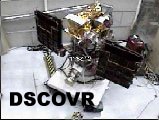A fresh document recently provided to DeSmog Blog by inside sources shows the critical importance of the Deep Space Climate Observatory (DSCOVR) to the US government.
Several universities and the National Oceanic and Atmospheric Administration (NOAA) commissioned the study to evaluate how this unique spacecraft could provide benefits to earth monitoring and space weather prediction.
The document is available for viewing here, and favorably compares DSCOVR’s capabilities with the stated science priorities of NOAA.
The conclusion: the spacecraft would be a boon to monitoring our rapidly warming planet and tracking dangerous solar flares.
NOAA’s primary interest in DSCOVR is predicting “space weather”. Radiation and charged particles from solar storms threaten billions of dollars of satellite hardware. By having DSCOVR positioned at the Lagrange 1 (L-1) point, one million miles towards the sun, the spacecraft could provide about one hour’s notice of approaching space weather, allowing these sensitive instruments to be shut down.
More importantly, DSCOVR would provide NASA the first-ever reliable data on the energy budget of our warming planet. For decades, they have tried in vain to make these critically important numbers add up, to no avail. This has been a little known but very real embarrassment to scientists at NASA.
The problem has been that all space-based data has come from low-Earth orbit measurements, between 100 and 1,200 miles from Earth. Because our planet is so large, this is like trying to map an elephant through a microscope – by the time you get back to where you started, the elephant has moved.
DSCOVR would instead live at L-1, one million miles distant and track the orbit of our planet around the Sun. For the first time ever, space-based instruments would be able to see the entire sunlit disk of our world and continuously measure energy absorbed and reflected back into space
One would hope that accurately tracking climate change would be a priority for NASA but they have instead chosen to mothball DSCOVR, citing “competing priorities”. Some speculate that the real reason is that DSCOVR could revolutionize Earth monitoring from space and threaten the careers of many scientists who have hitched their wagons to low-Earth orbit technology.
It would certainly not be the first time that the scientific establishment tried to suppress a promising new methodology. I recall the case of a certain Hungarian doctor who was ridiculed out of his profession for suggesting that his colleagues wash their hands between performing autopsies and delivering babies.
It is also interesting that this report on DSCOVR was not referenced or released in any of the material provided to DeSmog Blog through freedom of information requests to NOAA or NASA. Not only were these requests long overdue the timelines stipulated under US federal law, it seems that important documents like this were withheld in their entirely. So much for transparency and openness in government… We are very grateful for documents like this that shed some light on this important mission and hope for more in the future.
Stay tuned…
Next post: How NASA lied to the media about DSCOVR.
Subscribe to our newsletter
Stay up to date with DeSmog news and alerts







